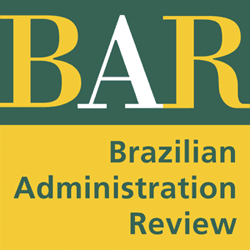EDITORIAL
Dear Readers,
As former Editor-in-Chief of BAR, I would like to bring forth some clarifications regarding the publication of the first paper in this issue.
Current peer review policy for papers submitted to ANPAD journals by members of ANPAD's editorial boards and directors recommends having an external editor - in accordance with ANPAD's manual of best practices for editors.
Nevertheless, I acted as editor of the first paper in this issue - authored by Jorge Carneiro, Angela da Rocha and Jorge Ferreira da Silva - along its whole editorial process. As you certainly know, the first author of this manuscript is BAR's present Editor-in-Chief and the third is ANPAD's President.
It is important to highlight that this paper was submitted on May 20th, 2010, when I was BAR's Editor-in-Chief and months before Jorge Carneiro was invited to be BAR's Editor.
At the time I invited Jorge Carneiro to replace me, we agreed that I should keep the position of editor for his already submitted paper. By the time the best practices manual for editors was approved, the authors had already re-submitted their paper in accordance with reviewers' recommendations and there would have been an enormous and unnecessary delay to replace me and start the whole review process again.
Rogério Quintella
Former Editor-in-Chief
Dear Readers,
I am happy to publish some more good contributions to our academic field.
The first article (Determinants of Export Performance: A Study of Large Brazilian Manufacturing Firms, by Jorge Carneiro, Angela da Rocha and Jorge Ferreira da Silva) discusses the effects of several determinants of the export performance of Brazilian firms. It also brings a methodological contribution: the advancement of what the authors call an "integrated framework for assessment of the degree of satisfactoriness of measurement models of reflectively-measured constructs".
The next manuscript ("Why Caipirinha?" - The Online via Chat Laddering Technique CAN Answer, by Bruno Bordeaux-Rego and colleagues) also brings an interesting methodological contribution: the use of online resources in the application of the laddering technique, specifically real-time chats for carrying out in-depth interviews.
The paper by Manuel Ferreira and Sungu Armagan (Using Social Networks Theory as a Complementary Perspective to the Study of Organizational Change) advances a set of theory-driven propositions related to organizational change, particularly in the case of organizations as social entities embedded in inter-organizational networks. The authors discuss the role of networks in complementing the external environment and the internal context for the understanding of organizational change.
Lindomar da Silva and Élvia Fadul (Organizational Culture and Discourses: A Case of Change in a Brazilian Public Organization) analyze the use of discourse as strategy for the dissemination of new cultural values in a particular case of a State Secretariat. They found that different discourses are used and that such discourses often do not mirror the official discourse.
The last piece (A Constructivist Perspective on Leadership Thought among Brazilian and North-American Scholars, by Anderson Sant'Anna and colleagues) addresses leadership theory and development and reveals that Brazilian and American schools have tended to select different theories. The idiosyncratic approaches adopted by each school are compared.
I hope you will enjoy reading these papers.
Jorge Carneiro
Editor-in-Chief
Publication Dates
-
Publication in this collection
29 Apr 2011 -
Date of issue
June 2011

